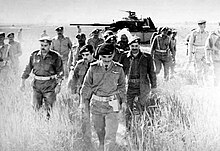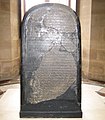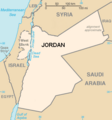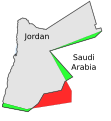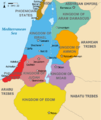Portal:Jordan
The Jordan Portal  Jordan, officially the Hashemite Kingdom of Jordan, is a country in the Southern Levant region of West Asia. Jordan is bordered by Syria to the north, Iraq to the east, Saudi Arabia to the south, and Israel and the occupied Palestinian territories to the west. The Jordan River, flowing into the Dead Sea, is located along the country's western border. Jordan has a small coastline along the Red Sea in its southwest, separated by the Gulf of Aqaba from Egypt. Amman is the country's capital and largest city, as well as the most populous city in the Levant. Modern-day Jordan has been inhabited by humans since the Paleolithic period. Three kingdoms developed in Transjordan during the Iron Age: Ammon, Moab and Edom, which were conquered by the Assyrian and later Babylonian empires. In the third century BC, the Arab Nabataeans established their kingdom centered in Petra. The Greco-Roman period saw the establishment of several cities in Transjordan that comprised the Decapolis. Later, the Islamic era began after end of Byzantine rule that set off Islamic empires of the Rashidun, Umayyad, Abbasid, and the Ottoman. Following the 1916 Great Arab Revolt during World War I, former Ottoman Syria was partitioned, leading to the establishment of the Emirate of Transjordan in 1921, which became a British protectorate. In 1946, the country gained independence and became officially known as the Hashemite Kingdom of Jordan. The country captured and annexed the West Bank during the 1948 Arab–Israeli War until it was occupied by Israel in 1967. Jordan renounced its claim to the territory to the Palestinians in 1988 and signed a peace treaty with Israel in 1994. Jordan is a semi-arid country, covering an area of 89,342 km2 (34,495 sq mi) with a population of 11.5 million, making it the eleventh-most populous Arab country. The dominant majority, or around 95% of the country's population, is Sunni Muslim, with the rest being mostly Arab Christian. Jordan was mostly unscathed by the violence that swept the region following the Arab Spring in 2010. From as early as 1948, Jordan has accepted refugees from multiple neighbouring countries in conflict. An estimated 2.1 million Palestinian refugees, most of whom hold Jordanian citizenship, as well as 1.4 million Syrian refugees, were residing in Jordan as of 2015. The kingdom is also a refuge for thousands of Christian Iraqis fleeing persecution. While Jordan continues to accept refugees, the large Syrian influx during the 2010s has placed substantial strain on national resources and infrastructure. The sovereign state is a constitutional monarchy, but the king holds wide executive and legislative powers. Jordan is a founding member of the Arab League and the Organisation of Islamic Cooperation. The country has a high Human Development Index, ranking 99th, and is considered a lower middle income economy. The Jordanian economy, one of the smallest economies in the region, is attractive to foreign investors based upon a skilled workforce. The country is a major tourist destination, also attracting medical tourism with its well-developed health sector. Nonetheless, a lack of natural resources, large flow of refugees, and regional turmoil have hampered economic growth. (Full article...) Selected article -The Battle of Karameh (Arabic: معركة الكرامة) was a 15-hour military engagement between the Israel Defense Forces (IDF) and combined forces of the Palestine Liberation Organization (PLO) and the Jordanian Armed Forces (JAF) in the Jordanian border town of Karameh on 21 March 1968, during the War of Attrition. It was planned by Israel as one of two concurrent raids on PLO camps, one in Karameh and one in the distant village of Safi. After Jordan lost control of the West Bank to Israel in 1967, Palestinian fighters known as fedayeen moved their bases to Jordan and stepped up their attacks on Israel and Israeli-occupied territories, taking the border town of Karameh as their headquarters. The IDF claimed that the purpose was to destroy the fedayeen camps at Karameh, and to capture the leader of the PLO Yasser Arafat as reprisal. Israel also wanted to punish Jordan for its perceived support to the fedayeen. A large Israeli force launched an attack on the town on the dawn of 21 March, supported by fighter jets. Israel assumed the Jordanian Army would choose to not get involved in the battle, but the latter deployed heavy artillery fire, while the Palestinian irregulars engaged in guerrilla warfare. The Israelis withdrew, or were repulsed, after a day-long battle, having destroyed most of the Karameh camp and taken around 140 PLO members prisoner. (Full article...) Selected biography -Abdullah I bin Al-Hussein (Arabic: عبد الله الأول بن الحسين, romanized: ʿAbd Allāh al-Awwal bin al-Ḥusayn, 2 February 1882 – 20 July 1951) was the ruler of Jordan from 11 April 1921 until his assassination in 1951. He was the Emir of Transjordan, a British protectorate, until 25 May 1946, after which he was king of an independent Jordan. As a member of the Hashemite dynasty, the royal family of Jordan since 1921, Abdullah was a 38th-generation direct descendant of Muhammad. Born in Mecca, Hejaz, Ottoman Empire, Abdullah was the second of four sons of Hussein bin Ali, Sharif of Mecca, and his first wife, Abdiyya bint Abdullah. He was educated in Istanbul and Hejaz. From 1909 to 1914, Abdullah sat in the Ottoman legislature, as deputy for Mecca, but allied with Britain during the First World War. During the war, he played a key role in secret negotiations with the United Kingdom that led to the Great Arab Revolt against Ottoman rule that was led by his father Sharif Hussein. Abdullah personally led guerrilla raids on garrisons. (Full article...) WikiProjectFor editor resources and to collaborate with other editors on improving Wikipedia's Jordan-related articles, see WikiProject Jordan. General images -The following are images from various Jordan-related articles on Wikipedia.
Selected city -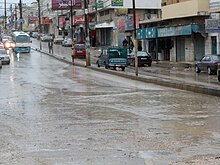 Der Abi Saeed (Arabic: دير أبي سعيد) is a city in Irbid Governorate in Jordan. It is named after a historic Christian chapel ('Der' in Arabic) in the place where the city is built. The city gained importance in the early 20th century after the formation of a self-governing body following the fall of the Ottoman Empire. Der Abi Saeed is the administrative center of the Koura Department, one of the nine departments of Irbid Governorate. (Full article...)
See also: List of cities in Jordan
Related portalsReligions in Jordan Arab states Other countries Recognized content
Featured articlesGood articles
TopicsSelected topic overview -
CategoriesSelected picture -An aerial view of part of the Zaatari refugee camp, which houses Syrian refugees, in July 2013. Associated WikimediaThe following Wikimedia Foundation sister projects provide more on this subject:
SourcesDiscover Wikipedia using portals |

